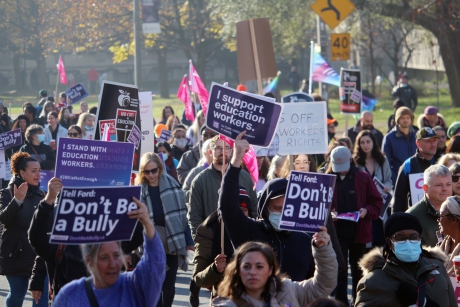Features
You are here
Education workers defy anti-strike law, force Tory backdown

November 8, 2022
The Conservative government in Ontario has been forced to rescind anti-union legislation after tens of thousands of education workers struck in defiance of the law.
More than 80% of the 55,000 members of the Ontario School Board Council of Unions (OSBCU-CUPE) voted 96% in favour of a strike to begin on November 4.
Decades of cuts by both Liberal and Conservative governments have also significantly increased the workload for many of the workers.
The union was demanding wage increases of 11.7 % over the three years of their contract – still below the levels of inflation but much higher than the 2% a year offered by the Tories. They were also demanding that minimum staffing levels be maintained so that workloads could be reduced and learning conditions could improve.
Tory premier Doug Ford responded to the strike threat by introducing Bill 28. The law was a massive overstep. It made the strike illegal by suspending and overriding the Canadian Charter of Rights and Freedoms and the Ontario Human rights code both of which guarantee the right to collective bargaining.
It also imposed colossal fines of $500,000 on the union for each day of the strike and $4,000 on each individual worker if they struck.
The response was swift. OSBCU announced that its members would still walk off the job and the union began planning rallies and pickets. Other unions in the province from both the private sector and other public sector workers vowed to join them.
The new law was seen as an attack on the whole trade union movement. On November 4, most schools in the province were shut down. Tens of thousands of workers rallied and picketed at the provincial legislature in Toronto, and strikers set up large pickets in both cities and small towns.
They were joined by a wide range of other trade unionists: transit workers, steelworkers, construction workers, and other public sector workers. Parents and students joined in and supported the actions.
In Peterborough, a small city of roughly 80,000 people, the picket at Tory Member of Provincial Parliament Dave Smith’s office stretched for more than a kilometre. The anger was palpable and the workers had lit a fuse.
The following day a mass rally shut down the core of Toronto and showed that it was not simply a one-day event.
Polling showed that 60% of the people supported the workers and 68% of parents with children in school believed that the Tories were responsible for the strike.
An emergency meeting was held by the Ontario Federation of Labour - the largest union federation in the province - and preparations were made for an even broader response. The meeting of heads of all the major unions agreed that a general strike would be called for November 14.
On Monday morning the government pre-empted the union press conference with one of their own where they announced that they would cancel Bill 28 and return to the bargaining table. The union announced it would end the strike and go back to talks. Thousands on the streets at rallies across the province became jubilant as the news spread as pickets became celebrations. The workers had forced the government to back down.
But the fight is not over. OSBCU workers are still without a contract and their demands have not been met. These workers—librarians, educational assistants, caretakers and clerical staff—have been given negligible wage increases for more than a decade meaning that many have fallen well below the salary required to live in the province.
More than half of them have had to take on a second job to make ends meet.
Other workers, including bus drivers are still on strike. Teachers’ unions are still in negotiation. The Tories are still going ahead with their plans to cut healthcare and privatise hospital services. Their agenda has not been defeated and millions are still suffering hardship from the skyrocketing cost of living while the corporations rake in billions in profits.
What the events showed is that a mass workers’ strike can provide a pole of attraction for the millions who are struggling to survive and can broaden the horizons for those who want to find a way to fight back. Workers have felt their collective power. It has changed the terrain and showed that the Tories can be beaten.
The next few weeks will be crucial. The union leaders will not automatically decide to continue this fight. They have capitulated many times in the past and can’t be trusted to carry this struggle forward. The need for a rank and file movement to keep the pressure on their own leaders is essential if we are to push for the kind of mass fights that are required to bring the Tories down.
Section:









